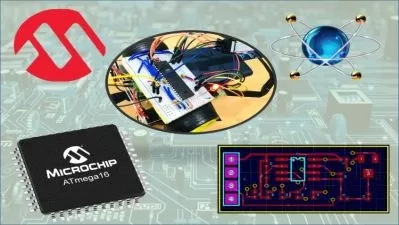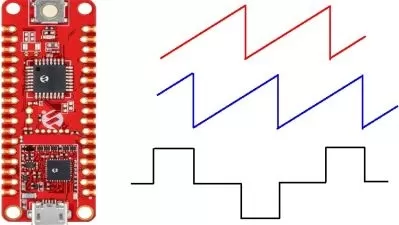Microcontroller for Everybody
Abiyot Aderie
2:18:08
Description
Mastering Microcontroller
What You'll Learn?
- Describe microcontroller and Embedded systems
- Identify application area of microcontroller and embedded systems
- List elements of Microcontroller
- Describe difference between microcontroller and microprocessor
- describe typical microcontroller pin diagram
- describe typical microcontroller architecture
- Describe the most popular and widely used microcontroller architectures in details
- Describe different types of embedded system operating systems
- Describe Hard real time and Soft real time embedded systems
- Learn how to write a program for typical microcontroller(Intel 8051) using C programming
- Learn How to interface Microcontroller with external devises.
Who is this for?
What You Need to Know?
More details
DescriptionThis should be your very first course to dive into the exciting world of "Microcontroller and Embedded Systems."
This course is mainly targeted for absolute beginners to learn microcontroller and Embedded system. In this course you will learn detail of popular and widely used microcontroller structure, architecture and pin diagram, then you will write a code for typical intel 8051 microcontroller using  the 'C ' programming language. This course also teaches you different embedded system operating system, so that at the end of the course it is help you to choice the right microcontroller and embedded system operating system software. Studying detail elements of microcontroller and embedded system helps trainees to develop their on microcontroller real world project. Once you understand the architectures and operating systems of embedded systems then you will able to design and develop real world embedded systems project.
Course Highlights:
Define Microcontroller
Describe Microcontroller and Microprocessor
Compare differences of several microcontrollers and microprocessors
Describe architecture of typical microcontroller
Explain different real time operating system
Embedded programming concepts
Registers and Memory
Describe pin diagram of Intel typical microcontroller(intel 8051..etc)
Timers, counters and Interrupts
Hardware and software interfacing methods
Embedded software design and analysis
Course Learning Outcomes:
Define embedded systems and identify applications to real word systems
Utilize hardware, software, and peripherals involved in an embedded system
Understand basic microprocessor and microcontroller functionality utilizing registers and memory and Hardware/Software interfacing concepts
Explain primary microcontroller capabilities and their applications for embedded system development
Why you learn this course?
A typical home in a developed country is likely to have 3 dozen microcontroller devices. Moreover, a mid-range auto-mobile has about 30 microcontrollers. Ranging from miniature devices (digital thermometers, smartwatches, calculators, mobile phones, cameras) to high-end consumer electronics (microwave ovens, washing machines, televisions, refrigerators, vending machines), you will almost always find a tiny microcontroller peeking at you from the inside. In 2019, the global microcontroller market size was valued at $16.49 billion which is expected to hit $42.19 billion by 2027. Did that change your mind?
These days our life is completely dependent on microcontroller, with the rise of edge computing and IoT, these microcontrollers(MCUs) can provide power and operation within a small space. A knowledge of microcontroller allows you to build a career exploring the farthest reaches of these devices and their operation. In this course you'll learn skills related to microcontroller and their components, allowing you to build a rewarding career in research and innovation. This course is an introduction to the basic principles and fundamental concepts of a microprocessor and Microcontroller. The trainees will be able to integrate these concepts into their day to day life, you can use it for everything, where control can be achieved via microcontroller(MCU).
Today MCUÂ found everywhere, In many home appliances such as washing machines, air conditioners, microwave ovens, vacuum cleaners, and refrigerators, microcontrollers (MCUs) are used for motor control, analog sensor measurements, front panel keypad control, and LED/LCD displays. Â
The microcontrollers used in almost all electronic devices. Having knowledge and skill of microcontroller help you to understand the 21 centuries electronic devises operation, control and enable you to identify and troubleshoot common common faults of automobile system, your house electronics appliances. The course help trainees to know everything of basic microcontroller concept.
Who this course is for:
- Anybody who want to know microcontroller from scratch level to developer level.
This should be your very first course to dive into the exciting world of "Microcontroller and Embedded Systems."
This course is mainly targeted for absolute beginners to learn microcontroller and Embedded system. In this course you will learn detail of popular and widely used microcontroller structure, architecture and pin diagram, then you will write a code for typical intel 8051 microcontroller using  the 'C ' programming language. This course also teaches you different embedded system operating system, so that at the end of the course it is help you to choice the right microcontroller and embedded system operating system software. Studying detail elements of microcontroller and embedded system helps trainees to develop their on microcontroller real world project. Once you understand the architectures and operating systems of embedded systems then you will able to design and develop real world embedded systems project.
Course Highlights:
Define Microcontroller
Describe Microcontroller and Microprocessor
Compare differences of several microcontrollers and microprocessors
Describe architecture of typical microcontroller
Explain different real time operating system
Embedded programming concepts
Registers and Memory
Describe pin diagram of Intel typical microcontroller(intel 8051..etc)
Timers, counters and Interrupts
Hardware and software interfacing methods
Embedded software design and analysis
Course Learning Outcomes:
Define embedded systems and identify applications to real word systems
Utilize hardware, software, and peripherals involved in an embedded system
Understand basic microprocessor and microcontroller functionality utilizing registers and memory and Hardware/Software interfacing concepts
Explain primary microcontroller capabilities and their applications for embedded system development
Why you learn this course?
A typical home in a developed country is likely to have 3 dozen microcontroller devices. Moreover, a mid-range auto-mobile has about 30 microcontrollers. Ranging from miniature devices (digital thermometers, smartwatches, calculators, mobile phones, cameras) to high-end consumer electronics (microwave ovens, washing machines, televisions, refrigerators, vending machines), you will almost always find a tiny microcontroller peeking at you from the inside. In 2019, the global microcontroller market size was valued at $16.49 billion which is expected to hit $42.19 billion by 2027. Did that change your mind?
These days our life is completely dependent on microcontroller, with the rise of edge computing and IoT, these microcontrollers(MCUs) can provide power and operation within a small space. A knowledge of microcontroller allows you to build a career exploring the farthest reaches of these devices and their operation. In this course you'll learn skills related to microcontroller and their components, allowing you to build a rewarding career in research and innovation. This course is an introduction to the basic principles and fundamental concepts of a microprocessor and Microcontroller. The trainees will be able to integrate these concepts into their day to day life, you can use it for everything, where control can be achieved via microcontroller(MCU).
Today MCUÂ found everywhere, In many home appliances such as washing machines, air conditioners, microwave ovens, vacuum cleaners, and refrigerators, microcontrollers (MCUs) are used for motor control, analog sensor measurements, front panel keypad control, and LED/LCD displays. Â
The microcontrollers used in almost all electronic devices. Having knowledge and skill of microcontroller help you to understand the 21 centuries electronic devises operation, control and enable you to identify and troubleshoot common common faults of automobile system, your house electronics appliances. The course help trainees to know everything of basic microcontroller concept.
Who this course is for:
- Anybody who want to know microcontroller from scratch level to developer level.
User Reviews
Rating
Abiyot Aderie
Instructor's Courses
Udemy
View courses Udemy- language english
- Training sessions 12
- duration 2:18:08
- Release Date 2022/12/03










